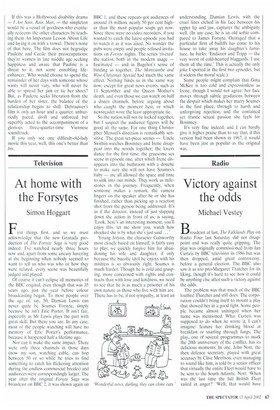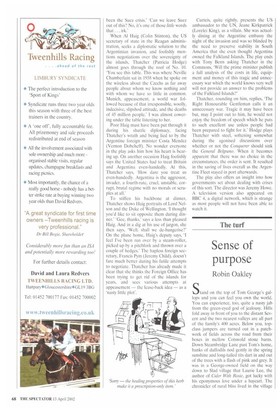Radio
Victory against the odds
Michael Vestey
Broadcast at last, The Falklands Play on Radio Four last Saturday did not disappoint and was really quite gripping. The play was originally commissioned from Ian Curteis by BBC television in 1986 but was then dropped, amid great controversy, before a general election. The BBC also saw it as too pro-Margaret Thatcher for its liking, though it's hard to see how it could be anything else after such a victory against the odds.
The problem was that much of the BBC loathed Thatcher and still does. The corporation couldn't bring itself to mount a play that showed her in a good light. Some people became almost unhinged when her name was mentioned. What Curteis was supposed to do when he wrote it, I can't imagine: feature her drinking blood at breakfast or snarling through fangs. The play, one of several programmes to mark the 20th anniversary of the conflict, has its delicious moments. In one. John Nom the then defence secretary, played with great accuracy by Clive Merrison, even managing to sound like him, is told by a senior officer that virtually the entire Fleet would have to be sent to the South Atlantic. Nott: 'When was the last time the full British Fleet sailed in anger?"Well, that would have been the Suez crisis.' Can we leave Suez Out of this? No, it's one of those little words that.. . irk.'
When Al Haig (Colin Stinton), the US secretary of state in the Reagan administration, seeks a diplomatic solution to the Argentinian invasion, and foolishly mentions negotiations over the sovereignty of the islands, Thatcher (Patricia Hodge) almost goes through the roof of No. 10. 'You see this table. This was where Neville Chamberlain sat in 1938 when he spoke on the wireless about the Czechs as far away people about whom we know nothing and with whom we have so little in common. Munich, appeasement, a world war followed because of that irresponsible, woolly, indecisive, slipshod attitude, and the deaths of 45 million people.' I was almost cowering under the table listening to her.
Poor Haig must have been put through it during his shuttle diplomacy, facing Thatcher's wrath and being lied to by the Argentine foreign minister Costa Mendez (Vernon Dobcheft). No wonder everyone in the play asks him how his heart is bearing up. On another occasion Haig foolishly says the United States had to treat Britain and Argentina even-handedly. At this, Thatcher says, 'How dare you treat us even-handedly. Argentina is the aggressor, invader, a fourth-rate, cruel, unstable, corrupt, brutal regime with no morals or scruples at all.'
To stiffen his backbone at dinner, Thatcher shows Haig portraits of Lord Nelson and the Duke of Wellington. 'I thought you'd like to sit opposite them during dinner.Gee, thanks,' says a less than pleased Haig. And in a dig at his use of jargon, she then says, 'Well, shall we de-hungerise?' On the plane home, Haig's deputy says, 'I feel I've been run over by a steam-roller, picked up by a pitchfork and thrown over a couple of hedges.' The hapless foreign secretary, Francis Pym (Jeremy Child), doesn't fare much better during his futile attempts to negotiate. Thatcher has already made it clear that she thinks the Foreign Office has been trying to get rid of the islands for years, and sees various attempts at appeasement — the lease-back idea — as a 'nasty little plot'. Curteis, quite rightly, presents the US ambassador to the UN, Jearie Kirkpatrick (Lorelei King), as a villain. She was actually dining at the Argentine embassy the night of the invasion and was so blinded by the need to preserve stability in South America that she even thought Argentina owned the Falkland Islands. The play ends with Tony Berm asking Thatcher in the Commons, `Will the prime minister publish a full analysis of the costs in life, equipment and money of this tragic and unnecessary war which the world knows very well will not provide an answer to the problems of the Falkland Islands?'
Thatcher, rounding on him, replies, 'The Right Honourable Gentleman calls it an unnecessary war. Tragic it may have been but, may I point out to him, he would not enjoy the freedom of speech which he puts to such excellent use unless people had been prepared to fight for it.' Hodge plays Thatcher with steel, softening somewhat during the agonised discussions over whether or not the Conauerer should sink the General Belgrano. When it becomes apparent that there was no choice in the circumstances, the order is sent. It resulted in the saving of lives overall as the Argentine Fleet stayed in port afterwards.
The play also offers an insight into how governments set about dealing with crises of this sort. The director was Jeremy Howe. A television version also appeared on BBC 4, a digital network, which is strange as most people will not have been able to watch it.



















































































 Previous page
Previous page